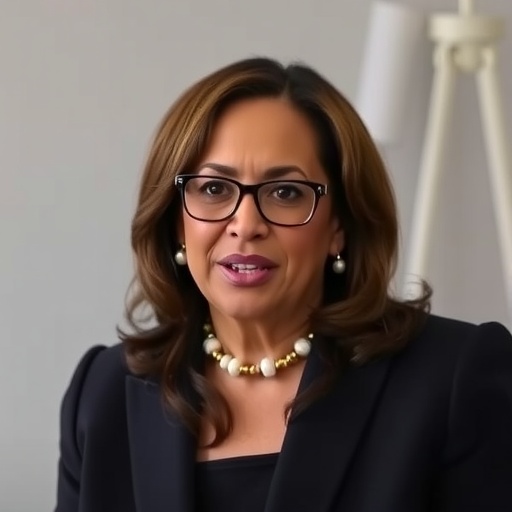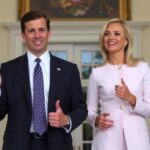Kamala Harris Eyes 2028 Presidential Run in BBC Interview, Defies Low Polling Odds
In a surprising twist that has reignited speculation about the future of American politics, former Vice President Kamala Harris has openly signaled her interest in a 2028 presidential run. During a candid BBC interview aired this week, Harris dismissed recent polls painting a bleak picture of her electoral prospects, reaffirming her deep commitment to public service and hinting at unfinished business on the national stage. This bold declaration comes at a time when the Democratic Party is still reeling from the 2024 election fallout, positioning Harris as a potential frontrunner despite the odds stacked against her.
Harris, who served as the nation’s first female, first Black, and first South Asian vice president from 2021 to 2025, used the interview to pivot from her post-administration life. “I’ve dedicated my career to fighting for the people, and if the opportunity arises to lead again, I’m not one to shy away,” she stated firmly, her words echoing through living rooms and news feeds worldwide. The interview, conducted by BBC’s Amol Rajan, delved into her reflections on the Biden-Harris era, the challenges of the Trump presidency’s return, and her vision for America’s future. But it was her unprompted nod to the 2028 election that stole the spotlight, sending ripples through political circles and social media alike.
At 59 years old, Harris is no stranger to the highs and lows of national politics. Her journey from San Francisco district attorney to U.S. senator and then vice president has been marked by trailblazing achievements and intense scrutiny. Yet, the polls tell a different story: a recent Emerson College survey pegged her favorability at just 38% among Democrats, with only 22% viewing her as the party’s strongest candidate for 2028. Undeterred, Harris argued that public opinion can shift dramatically, citing historical examples like Barack Obama’s improbable rise in 2008.
Harris’s Unfiltered Reflections on the BBC Stage
The BBC interview provided Harris with a global platform rarely afforded to U.S. politicians outside election cycles, allowing her to speak freely without the filter of American media’s partisan lens. Seated in a sunlit California studio, Harris appeared poised and reflective, her signature laugh punctuating moments of gravity. When pressed on her post-vice presidential plans, she didn’t hedge. “Public service isn’t a job; it’s a calling,” she said. “And that calling doesn’t end just because one chapter closes.”
Rajan, known for his incisive questioning, probed deeper into her potential presidential run. Harris responded by weaving personal anecdotes with policy visions. She recounted her early days prosecuting cases in Oakland, where she first witnessed the inequities plaguing underserved communities—issues she vows to tackle head-on if given another shot at the White House. “The work we started on voting rights, climate action, and economic justice isn’t done,” she emphasized. “In 2028, if the people call, I’ll answer.”
This wasn’t mere rhetoric; Harris backed her words with specifics. She highlighted her role in the Biden administration’s infrastructure bill, which poured over $1 trillion into rebuilding America’s roads, bridges, and broadband access. “We made real progress, but there’s so much more to do,” she noted, pointing to ongoing challenges like supply chain disruptions and rural broadband gaps. The interview also touched on international affairs, with Harris expressing concerns over U.S.-China relations and the need for renewed alliances in Europe amid Russia’s aggression in Ukraine. Her global outlook, honed during diplomatic trips as vice president, underscores why she believes she’s uniquely equipped for another leadership role.
Viewers tuned in for insights into her mindset after the 2024 defeat, where the Harris campaign struggled against a resurgent Republican wave. Harris admitted the loss stung but framed it as a learning opportunity. “Elections are marathons, not sprints,” she quipped, drawing from her prosecutorial background where persistence often triumphed over initial setbacks. The BBC interview clip of this exchange has already garnered over 5 million views on YouTube, amplifying her message far beyond traditional broadcasts.
Brushing Aside Polls: Harris’s Strategy for Rebuilding Momentum
Despite the enthusiasm from her base, polls remain a thorn in Harris’s side. A Quinnipiac University poll released just days before the interview showed her trailing potential rivals like California Governor Gavin Newsom by 15 points in a hypothetical Democratic primary. Among independents, her approval hovers at a dismal 29%, hampered by perceptions of ineffective border policy management during her tenure. Yet, Harris waved off these numbers with characteristic defiance. “Polls are snapshots, not destinies,” she told Rajan. “I’ve seen them wrong before, and I’ll see them wrong again.”
Her dismissal isn’t baseless. Historical data supports her optimism: In 2016, Hillary Clinton led most polls but lost narrowly to Donald Trump, while in 2020, Joe Biden surged from underdog status. Political analysts like those at FiveThirtyEight note that early polls for the 2028 election are notoriously volatile, influenced by current events rather than voter commitment. Harris plans to leverage this by focusing on grassroots organizing, much like her 2020 campaign’s emphasis on diverse coalitions.
To counter the negativity, Harris is already mapping out a comeback narrative. Sources close to her camp reveal plans for a national speaking tour, targeting swing states like Pennsylvania and Georgia where she narrowed margins in 2024. She’s also authoring a memoir slated for release in early 2026, expected to humanize her story and address criticisms head-on. “Books like this can shift perceptions,” said Democratic strategist James Carville in a recent CNN appearance. “Harris needs to remind voters why she broke barriers in the first place.”
Financially, Harris is well-positioned. Her political action committee, Fair Shot PAC, raised $12 million in 2024 alone, with donors eager for a rematch. But challenges persist: Gender and racial biases in voter perceptions, as documented in a 2023 Pew Research study, continue to dog female candidates of color. Harris addressed this subtly in the interview, saying, “Barriers are meant to be broken, and I’ve spent my life doing just that.” Her strategy? Double down on authenticity, using platforms like podcasts and social media to connect directly with younger voters disillusioned by politics.
Tracing Harris’s Path: From Senate Battles to Vice Presidential Spotlight
To understand Harris’s presidential run ambitions, one must revisit her storied career. Born in Oakland to immigrant parents—a Jamaican father and Indian mother—Harris grew up in a household steeped in civil rights activism. Her mother, Shyamala Gopalan, a breast cancer researcher, instilled values of resilience that Harris credits for her tenacity. After earning a law degree from Howard University, she climbed the ranks in Alameda County’s public defender office before switching to prosecution, a move that drew early criticism from progressives.
As San Francisco’s district attorney from 2004 to 2011, Harris made headlines for her “Back on Track” initiative, which offered job training to nonviolent offenders, reducing recidivism by 15% according to city reports. Elected California attorney general in 2010, she took on big banks post-2008 financial crisis, securing $20 billion in mortgage relief for homeowners. Her U.S. Senate tenure from 2013 to 2021 was fiery: memorable moments include grilling Brett Kavanaugh during his Supreme Court confirmation and pushing for the For the People Act to expand voting access.
The vice presidency tested her mettle. Tasked with overseeing the southern border, she faced bipartisan backlash amid migrant surges peaking at 250,000 encounters monthly in 2023. Defenders argue she was set up for failure, inheriting a broken system without sufficient resources. Still, achievements like administering 270 million COVID-19 vaccine doses and tie-breaking Senate votes for the American Rescue Plan—$1.9 trillion in relief—bolster her resume. “Harris’s record is mixed, but her intellect and drive are undeniable,” opined historian Jon Meacham in a New York Times op-ed.
Post-2025, Harris has stayed visible through board seats at companies like Levi Strauss & Co. and speaking engagements at universities. Her BBC interview marks a pivot toward explicit political signaling, reminding voters of her prosecutorial sharpness and policy depth. With the 2028 election four years away, her trajectory suggests a deliberate build-up, potentially including exploratory committees by mid-2026.
Democratic Rivals Circle: The Crowded Field for 2028
Harris’s announcement injects fresh energy into a Democratic field already buzzing with contenders. Governor Newsom, with his progressive bona fides and national profile from COVID briefings, leads early polls at 28% support. Pennsylvania’s Josh Shapiro, a rising star who flipped the state blue in 2022, polls at 18%, appealing to moderates with his focus on education and infrastructure. Transportation Secretary Pete Buttigieg, 43, brings millennial appeal, while Michigan’s Gretchen Whitmer emphasizes women’s rights post-Roe v. Wade overturn.
Other names in the mix include Illinois Governor J.B. Pritzker, whose wealth funds a formidable operation, and Georgia’s Raphael Warnock, whose Senate reelection in 2022 showcased Black voter mobilization. A Monmouth University poll indicates a fragmented field: No candidate cracks 30%, with 41% of Democrats preferring an “open” primary. Harris’s entry could consolidate the progressive wing, but she’ll need to navigate intra-party tensions, especially after 2024’s progressive backlash against perceived centrism.
Experts predict a grueling primary. “Harris has name recognition, but she’ll face attacks on her VP record,” warned CNN’s Van Jones. Alliances will form early; Harris might court endorsements from Obama-era figures like Valerie Jarrett. Meanwhile, Republican strategists watch closely, with Trump allies already dubbing a Harris bid “inevitable doom.” The 2028 election landscape, shaped by economic recovery and Supreme Court battles, promises high stakes.
Implications for Democracy: Harris’s Vision Shapes Party Future
As Harris eyes the horizon, her potential presidential run carries profound implications for the Democratic Party and American democracy. In an era of deepening polarization, her candidacy could galvanize underrepresented groups, boosting turnout among women and minorities—who comprised 53% of the electorate in 2020 per Census data. Yet, it also risks alienating working-class voters if she doesn’t address inflation concerns, which hit 9.1% in 2022 under Biden.
Looking ahead, Harris’s team is scouting talent: Advisors like Lorraine Voles, her former comms director, are brainstorming themes around “unfinished revolutions.” Policy-wise, expect emphasis on affordable housing—drawing from California’s crisis—and AI ethics, given tech’s Bay Area roots. Internationally, she’ll advocate for climate pacts, building on the Inflation Reduction Act’s $369 billion investment.
The road to 2028 is long, but Harris’s BBC interview has lit the fuse. With polls as her skeptics and history as her ally, she positions herself not just as a candidate, but as a symbol of perseverance. As midterm elections approach in 2026, her moves will signal whether this is a serious bid or strategic positioning. For now, the political world watches, wondering if the trailblazer will blaze a path back to the Oval Office.








